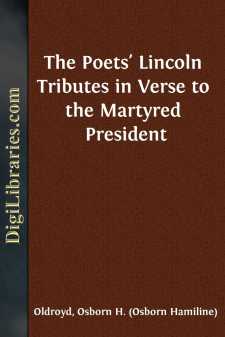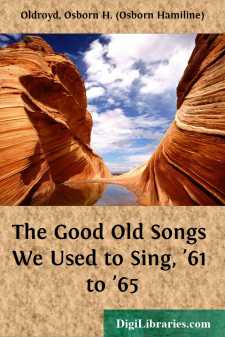Categories
- Antiques & Collectibles 13
- Architecture 36
- Art 48
- Bibles 22
- Biography & Autobiography 813
- Body, Mind & Spirit 141
- Business & Economics 28
- Children's Books 12
- Children's Fiction 9
- Computers 4
- Cooking 94
- Crafts & Hobbies 4
- Drama 346
- Education 46
- Family & Relationships 57
- Fiction 11826
- Games 19
- Gardening 17
- Health & Fitness 34
- History 1377
- House & Home 1
- Humor 147
- Juvenile Fiction 1873
- Juvenile Nonfiction 202
- Language Arts & Disciplines 88
- Law 16
- Literary Collections 686
- Literary Criticism 179
- Mathematics 13
- Medical 41
- Music 40
- Nature 179
- Non-Classifiable 1768
- Performing Arts 7
- Periodicals 1453
- Philosophy 64
- Photography 2
- Poetry 896
- Political Science 203
- Psychology 42
- Reference 154
- Religion 513
- Science 126
- Self-Help 83
- Social Science 81
- Sports & Recreation 34
- Study Aids 3
- Technology & Engineering 59
- Transportation 23
- Travel 463
- True Crime 29
The Poets' Lincoln Tributes in Verse to the Martyred President
Description:
Excerpt
Some years ago, while editing Henry C. Whitney's "Life of Lincoln" I showed a photograph of the bust of Lincoln by Johannes Gelert, the most intellectual to my mind of all the studies of his face, to a little Italian shoeblack, and asked him if he knew who it was. The boy, evidently prompted by a recent lesson at school, said questioningly, "Whittier?—Longfellow?" I replied, "No, it is Lincoln, the great President." He answered, "Well, he looks like a poet, anyway."
This verified a conclusion to which I had already come: Lincoln, had he lived in a region of greater culture, such as New England, might not have adopted the engrossing pursuits of law and politics, but, as did Whittier, have remained longer on the farm and gradually taken up the calling of letters, composing verse of much the same order as our Yankee bards', and poetry of even higher merit than some produced.
It is not generally known that Lincoln, shortly before he went to Congress, wrote verse of a kind to compare favorably with the early attempts of American poets such as those named. Thus the two poems of his which have been preserved, for his early lampoons on his neighbors have happily been lost, are equal in poetic spirit and metrical art to Whittier's "The Prisoner for Debt," to which they are strikingly similar in melancholic mood.
In 1846, at the age of 37, Lincoln conducted a literary correspondence with a friend, William Johnson by name, of like poetic tastes. In April of this year he wrote the following letter to Johnson:
Tremont, April 18, 1846.
FRIEND JOHNSTON: Your letter, written some six weeks since, was received in due course, and also the paper with the parody. It is true, as suggested it might be, that I have never seen Poe's "Raven"; and I very well know that a parody is almost entirely dependent for its interest upon the reader's acquaintance with the original. Still there is enough in the polecat, self-considered, to afford one several hearty laughs. I think four or five of the last stanzas are decidedly funny, particularly where Jeremiah "scrubbed and washed, and prayed and fasted."
I have not your letter now before me; but, from memory, I think you ask me who is the author of the piece I sent you, and that you do so ask as to indicate a slight suspicion that I myself am the author. Beyond all question, I am not the author. I would give all I am worth, and go in debt, to be able to write so fine a piece as I think that is. Neither do I know who is the author. I met it in a straggling form in a newspaper last summer, and I remember to have seen it once before, about fifteen years ago, and this is all I know about it.
The piece of poetry of my own which I alluded to, I was led to write under the following circumstances. In the fall of 1844, thinking I might aid some to carry the State of Indiana for Mr. Clay, I went into the neighborhood in that State in which I was raised, where my mother and only sister were buried, and from which I had been absent about fifteen years.
That part of the country is, within itself, as unpoetical as any spot of the earth; but still, seeing it and its objects and inhabitants aroused feelings in me which were certainly poetry; though whether my expression of those feelings is poetry is quite another question. When I got to writing, the change of subject divided the thing into four little divisions or cantos, the first only of which I send you now, and may send the others hereafter.
Yours truly,
A....



